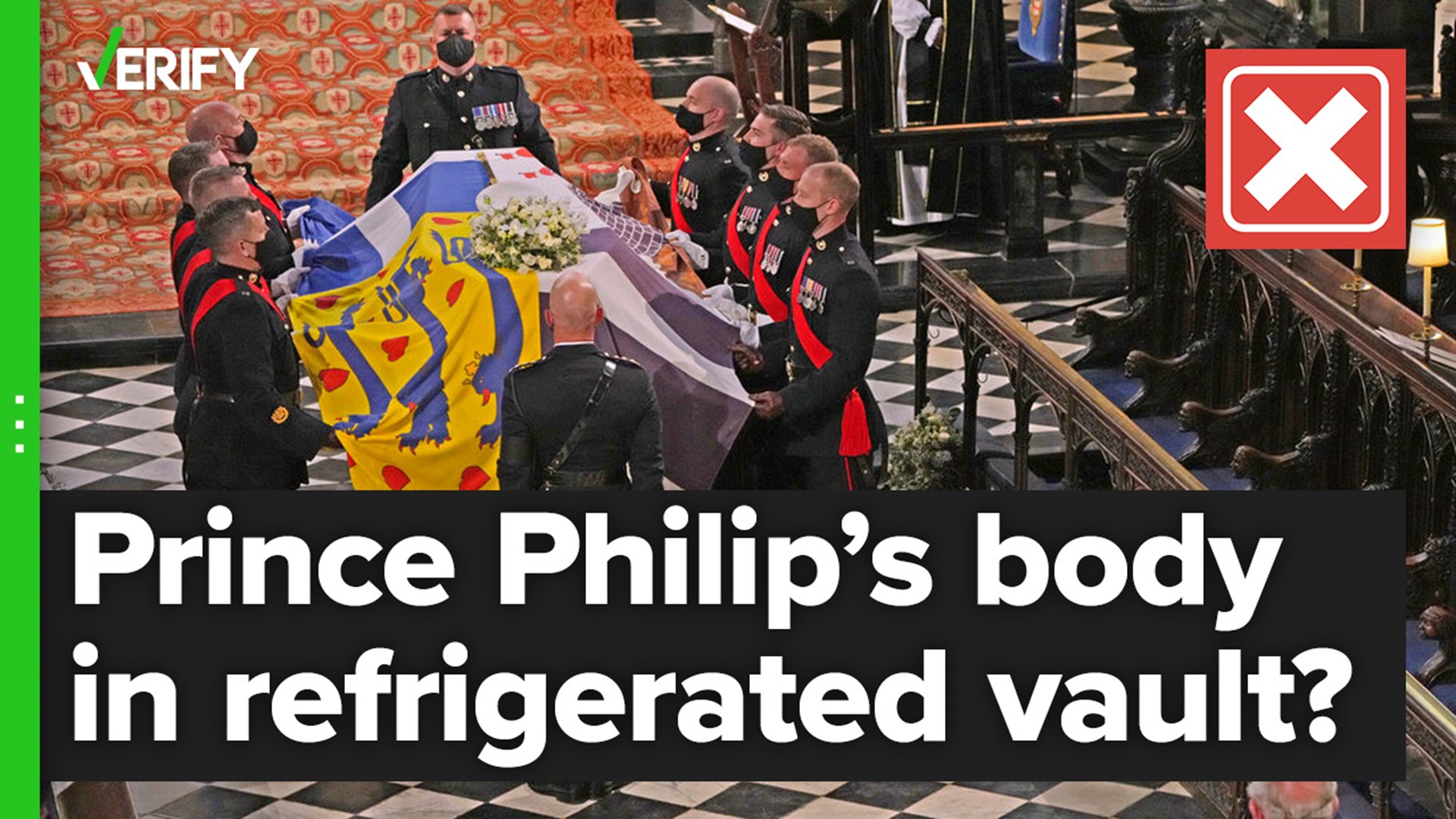Queen Elizabeth II’s death on Sept. 8 set in motion a 10-day mourning period that will end following her state funeral Sept. 19. Following the news of her death, it was reported by British media that her late husband, Prince Philip, would be moved from the royal vault to be buried alongside her.
In a tweet liked more than 200,000 times, American poet Mira Gonzalez claimed Prince Phillip was placed in the Royal Vault, likening it to a “fancy refrigerator,” until he could be buried with the queen. One of the most popular replies to the tweet asked if it was true.
THE QUESTION
Was Prince Philip’s body put in a refrigerated vault?
THE SOURCES
College of St. George, which runs St. George’s Chapel, the location of the royal vault
Photos from the Royal Collection Trust
Julian Litten, Ph.D, a vice president for the Church Monuments Society in the United Kingdom
THE ANSWER
No, Prince Philip’s body was not put in a refrigerated vault. His body was placed in the Royal Vault, which is a burial chamber that is not refrigerated.
WHAT WE FOUND
At the conclusion of his funeral service in April 2021, Prince Philip’s coffin was lowered into the Royal Vault, a burial chamber located in St. George’s Chapel on the grounds of Windsor Castle, the Royal Household at Buckingham Palace says. This lowering of his coffin can be seen in Buckingham Palace's video of the funeral.
Although the Royal Vault had intended to be just a temporary residence for Prince Philip’s body, that doesn’t mean he was frozen or stored in a morgue. The Royal Vault, Buckingham Palace says, is one of two major burial vaults in St. George’s Chapel, which also houses several royal tombs.
“It is merely an ordinary (though terribly grand) vault, where coffins of monarchs and their consorts are temporarily deposited until such time as their permanent spaces in St George's Chapel have been decided upon and constructed, after which their remains will be transferred there for permanent deposit,” said Julian Litten, a vice president for the Church Monuments Society in the United Kingdom. “This has been the case since the death of King Edward VII in 1910, and no doubt will continue for many years to come.”
When Litten says it is an “ordinary vault,” he means that it is simply an underground chamber made of stone without any kind of refrigeration whatsoever.
The Royal Vault has been used for both temporary and permanent burials since it accepted its first resident in 1810. The College of St. George, which runs St. George’s Chapel, says 50 people have been buried in the Royal Vault over the years, although every coffin lowered into the Royal Vault since 1931 has only remained there temporarily.
More from VERIFY: Fact-checking images of Queen Elizabeth II following her death
Three photos of the royal vault from the Royal Collection Trust show the inside of the burial chamber. The pictures depict a stone room with high arches, which includes space for coffins both at the center of the room and on shelves at the sides of the room. A coffin at the center of the room in two photos belongs to King Edward VII, whom the College of St. George says is now buried in a chapel tomb separate from the Royal Vault.
Today, three British kings remain buried in the Royal Vault, the College of St. George says. The most recent of those kings is King William IV, who died in 1837.
While the exact details of the late queen’s burial have yet to be officially announced, the BBC reports that her coffin will be lowered into the Royal Vault much the same way Prince Philip’s coffin was. She will then be moved to the King George VI Memorial Chapel, a small alcove to the side of the main chapel, to be buried next to her late father, King George VI.
This is actually similar to the circumstances of her father’s burial. The College of St. George says King George VI was buried in the royal vault in 1952, and later moved to his namesake chapel in 1969.
Media reports say Prince Philip will also be moved to King George VI Memorial Chapel to be placed alongside Queen Elizabeth II, although Buckingham Palace has not yet revealed official plans.
More from VERIFY: Yes, King Charles III’s likeness will start appearing on money in the UK

